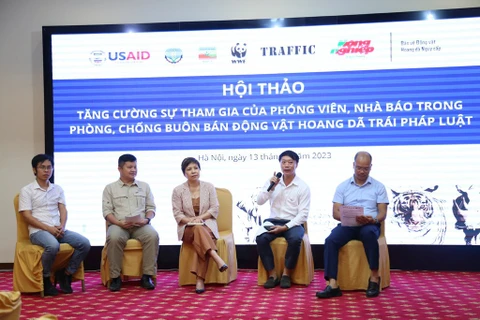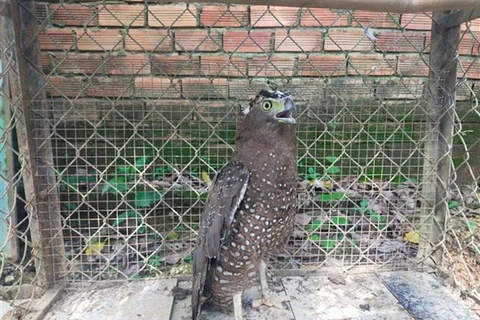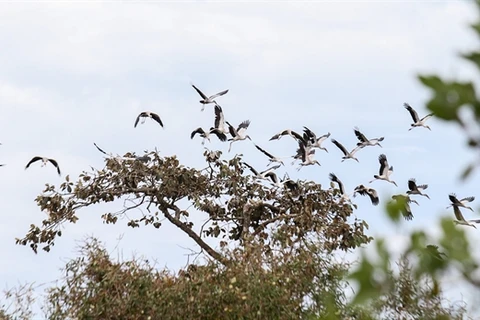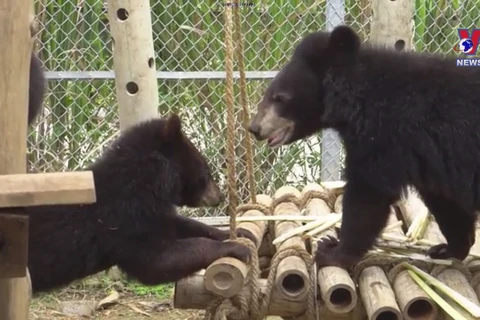Hanoi (VNA) – Education for Nature - Vietnam (ENV) on September 6 released a report on the sentencing of wildlife crimes in the country last year, highlighting a high rate of criminals arrested for their involvement in wildlife trafficking and trading cases.
The report was based on 156 wildlife crime cases uncovered in 2022 as recorded by ENV.
Analysis showed that the rate of detained criminals in wildlife crime cases averaged 92.2% during 2018 - 2022, compared to the 84.6% during 2014 - 2017.
The rate of such cases brought to trial also increased substantially. Between 2018 and 2021, after the amended Penal Code took effect in 2018, the rate of cases with arrested criminals brought to trial stood at 90.9%, rising by nearly 30% from the 62.2% recorded during the previous period.
The average prison sentence given to a wildlife-related criminal in 2022 was 3.1 years. Though this figure declined from the longest average jail term of 4.45 years, recorded in 2019, it still doubled the average jail term of 1.2 years in 2017.
ENV Deputy Director Bui Thi Ha said the abovementioned results indicate that Vietnam has continued to make improvements after the amended Penal Code came into force. This is an important stride in judicial reforms, helping provide a solid legal foundation for relevant agencies to investigate and deal with wildlife crimes.
However, she also pointed out that wildlife smuggling via ports remains a big challenge needing more attention from authorities.
Since 2015, the ENV has recorded 34 wildlife trafficking cases uncovered at seaports of Vietnam with nearly 80 tonnes of elephant ivory, rhino horn, and pangolin scales seized. But only three persons involved in these cases have been given punishments so far, Ha noted.
The ENV report also underlined the importance of detaining and investigating ringleaders of wildlife trafficking, an issue that should be given the top priority, instead of only dealing with their henchmen.
In addition, in-depth probes to find out owners of the seized batches also need to be prioritised. Authorities should consider applying the legal rules on money laundering, tax evasion, and trade fraud to deal with ringleaders.
Ha suggested authorities expand cooperation with law enforcement bodies, both in Vietnam and other countries, to collect information and investigate trans-national wildlife trafficking rings.
The confiscation of smuggled batches at port can partly disrupt illegal wildlife trade. However, law enforcement agencies can completely crack down on trafficking rings only when ringleaders are arrested and appropriate punishments imposed, she opined.
Therefore, the ENV proposed authorities make use of information from initial seizures to collect evidence and carry out investigations so as to arrest and punish ringleaders in an effort to eradicate the illegal wildlife trade in Vietnam.
In another report, the ENV said that in 2022, law enforcement bodies, mainly the public security and forest protection forces, responded to 97% of the wildlife violations reported via the ENV hotline 1800-1522. The hotline helps people quickly contact with authorities and report violations.
Authority responsiveness is key to setting up and maintaining effective cooperation with local residents to combat wildlife crimes.
However, despite a relatively high rate of response to reports, the rate of cases successfully dealt with remains low, at 28.9%. Only one in every three violations related to live wild animals was successfully handled.
Given this, local authorities need to improve the effectiveness to raise the rate of successfully handled cases to at least 50% in the coming years, according the ENV./.

























